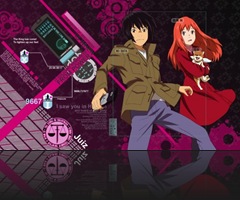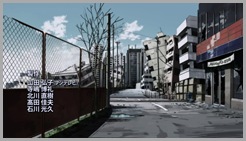Eden of The East the Movie II: Paradise Lost
Description:
ten missiles strike Japan. However, this unprecedented terrorist act, later to be known as "Careless Monday," does not result in any apparent victims, and is soon forgotten by almost everyone. Then, 3 months later... Saki Morimi is a young woman currently in the United States of America on her graduation trip. But just when she is in front of the White House, Washington DC, she gets into trouble, and only the unexpected intervention of one of her fellow countrymen  saves her. However, this man, who introduces himself as Akira Takizawa, is a complete mystery. He appears to have lost his memory. and he is stark naked, except for the gun he holds in one hand, and the mobile phone he's holding with the other hand. A phone that is charged with 8,200,000,000 yen in digital cash.
saves her. However, this man, who introduces himself as Akira Takizawa, is a complete mystery. He appears to have lost his memory. and he is stark naked, except for the gun he holds in one hand, and the mobile phone he's holding with the other hand. A phone that is charged with 8,200,000,000 yen in digital cash.


The King Of Eden
The first Eden of the East movie is out and near as I can tell not much actually happened. Still I’m glad I got to finally see it, I really love the animation used, the attention to detail is unmatched in my experience. Hopefully more will happen in the second movie, this one leaves a lot of loose ends.
The second film, Eden of The East the Movie II: Paradise Lost
Nine years ago, the words ‘terror’ and ‘terrorist’ took on an entirely new significance for many Americans, including myself. Personally, prior to 9/11, whenever the word terrorist came up, I thought of the ‘bad future’ in Back to the Future Part II, in which Biff Tannen rose to power by using the Sports Almanac to win all the bets. I shit you not.
Who was it, the principal guy, who Marty runs into (and ends up on the wrong end of his shotgun) who refers to these guys terrorists. They were guys who show up in a burnt-out beater, fill your house full of bullet holes, and are gone as soon as they arrive. But neither Marty nor the principal are injured by the attack. The ‘terrorists’ were fearsome, but somehow, they were also a joke. The film Brazil takes a similar, dark comedic tack to terrorists as more of a nuisance to the people than a real threat.
Eden of the East throws around the terms ‘terror’ and ‘terrorist’ in way that makes me recall those other films. In the world of Eden of the East, it denotes individuals or groups who engage more in mischief than terror, or at most, the threat of death and destruction, while delivering only destruction at best. Such was the Careless Monday incident that took place prior to the timeline of the show or its two sequel films: a big hole in Tokyo was made, but no casualties.
It makes you wonder as well as wish that the World Trade Center site had been totally devoid of people when the attacks took place. After all, it is the lives we mourn the most by far, not the structures. Still, New York is and always will be conspicuous in the towers’ absense, even if they’re replaced by newer, shinier, taller skyscrapers. Even if there hadn’t been any people in or around the towers when they fell, their falling would have still caused a shock.
 The Seleção, operating under the motto “Noblesse Oblige” share a lot of qualities with terrorists. They operate in secret for the most part, with large amounts of funds at their disposal. They act unilaterally and outside the constraints of the law. They are deemed ‘noble’ by their benefactor, Mr. Outside; all terrorists believe they’re noble. And their goal is to improve the nation and become its messiah. Improving it to their specs, based on their impressions of that nation’s society, mind you. Without their input or consent. All of this is fairly innocent compared with mass murder, but its well within their means to kill lots of people with the resources on hand. Thankfully, this series doesn’t take so dark a turn, and this doesn’t happen.
The Seleção, operating under the motto “Noblesse Oblige” share a lot of qualities with terrorists. They operate in secret for the most part, with large amounts of funds at their disposal. They act unilaterally and outside the constraints of the law. They are deemed ‘noble’ by their benefactor, Mr. Outside; all terrorists believe they’re noble. And their goal is to improve the nation and become its messiah. Improving it to their specs, based on their impressions of that nation’s society, mind you. Without their input or consent. All of this is fairly innocent compared with mass murder, but its well within their means to kill lots of people with the resources on hand. Thankfully, this series doesn’t take so dark a turn, and this doesn’t happen.
Whew…sorry about that! Anywho, Eden of the East: Paradise Lost, a film that follows The King of Eden and completes the story begun in the original anime, which not only had my favorite opening credit sequence to date, but had one of the best starts of all the anime I’ve seen. The series and these films never really reached the same stratospheric highs of those first episodes, but remained above average, solid storytelling.
New York of the not-too-distant future. As usual, this film is chock full of surprisingly accurate settings: I’ve visited Tokyo between the two Eden films, and in this second one, I noticed the characters were in Chuo, Shibuya, Odaiba, Toyosu, and Sakuradamon. The detail of the settings are impressive and lend the film the same immersive quality of the series. I also enjoyed the character design of the Eden franchise, particularly the adorable Saki and the fat NEET computer genius. The romance between Akira and Saki gets little play in the film, as the two are separated for most of it, but everything Saki does is for Akira’s sake. It may not be in your face, but her love and concern does show through in the film.
The film also takes a few cracks at modern Japanese society, courtesy of arguably the shrewdest but most cynical of the Seleção. ‘This is a nation of 100 million egoists…prime ministers are nothing but scapegoats,’ he says. To a degree, that’s true. They had just switched PMs the week I visited; not because of any scandal or crime, but simply due to not fulfilling a campaign promise. Our President has used the previous president as a scapegoat for most of our problems, and he will be used as a scapegoat by his eventual successor, so I guess Japan isn’t alone here; but a change of leaders happens more often there than here since ours can break promises for eight years and not step down.
That same cynical Seleção would also consider the American Dream an encumbrance to a nation’s success: ‘citizens are parts for improving a nation,’ nothing more; and be believes individuality is an inconvenience to that nation. ‘It is impossible for everyone to become someone,’ he says, exposing his narrow understanding of society. Japan may seem conservative on some levels, but nobody can doubt that the ambitions of individuals have helped more than harmed both Japan and the states.
Finally, Japan is on the same level of development and prosperity as America, which means, inexorably, there’ll a certain section of society doing absolutely nothing. NEET may be a term coined in Japan, but there may be more NEETS in ![[large][AnimePaper]wallpapers_Eden-of-the-East_Bu-Chan(1_6)__THISRES__101509 [large][AnimePaper]wallpapers_Eden-of-the-East_Bu-Chan(1_6)__THISRES__101509](https://etccafes.files.wordpress.com/2010/09/largeanimepaperwallpapers_edenoftheeast_buchan1_6__thisres__101509_thumb121.jpg?w=246&h=156) America. There are probably also more NEETs in both countries than there are ‘chosen’ individuals whose circumstances have in one way or another led them to live lives of privilege and obligation – in other words, nobility. It stands to reason the NEETS would outnumber the nobles.
America. There are probably also more NEETs in both countries than there are ‘chosen’ individuals whose circumstances have in one way or another led them to live lives of privilege and obligation – in other words, nobility. It stands to reason the NEETS would outnumber the nobles.
Seleção IX, or Akira, believes he’s been given the power to shake the nation like a tree until all the NEETS come out, then inspire them to put their NEETness to use improving their nation. The Seleção’s AI concierges may refer to their masters as messiahs, but IX and Mr. Outside seem to agree that losers are the real saviors of society, despite everyone else’s revulsion to them. It’s true that it’s impossible for everyone to become someone. But I don’t want to live in a world where nobody tries.
Tags:
Review
The return of Kenichi: The Mightiest Disciple
—————
Ao no Exorcist
—————
Beelzebub
—————
Gintama
—————
Gintama: anime/manga mentions or illustrates
—————
Heroic Age
—————
Kimi ni Todoke
—————
Rurouni Kenshin
—————
Ichiban Ushiro no Daimaou
—————
Togainu no Chi
—————









__THISRES__186768.jpg)



